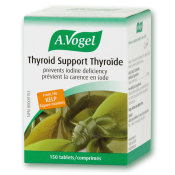What are the thyroid hormones?
There are only a few that we'll take a moment to highlight.
- Thyrotropin-releasing hormone (TRH): This hormone can be thought of as the first domino to fall. This hormone is released form the hypothalamus and signals the release of TSH.
- Thyroid-stimulating hormone (TSH): This hormone is released from the anterior pituitary gland and plays a role in stimulating the butterfly shaped thyroid gland at the base of the neck to release our next family members.
- Thyroxine (T4): This is the inactive form of T3 and is often transported around the body to various tissues and organs following its secretion into the bloodstream.
- Triiodo-thyronine (T3): When T4 arrives at certain organs, there are a variety of enzymes including type 1 deiodinase (D1) and type 2 deiodinase (D2) that convert T4 to T3 by removing an iodine group. T3 is the active form.
What are the common symptoms of an underactive thyroid?
Thyroid hormones play a large role in physical and cognitive development. They are also heavily involved in metabolic processes, bone and muscle health, and impact every organ system in the body.
As mentioned earlier, a hypothyroid state can make you feel fatigued and sluggish as your metabolism slows. If the workers in a steam ship weren't throwing enough coal into the furnaces, there wouldn't be enough power to keep the ship moving 'full steam ahead'.
This also means the fires of the body aren't burning as many calories, so weight gain is another sign in addition to sensitivity to cooler temperatures. Skin may start to dry out which may also lead to a dry scalp and hair thinning. There are a number of other signs and symptoms because as noted, the hormones impact all organ systems, but these are a few to keep your eye on.
What causes an underactive thyroid?
There are a few factors that influence an underactive thyroid including pathological, medication-induced or nutritional.
The most common cause of hypothyroidism is due to an iodine deficiency as the family of thyroid hormones require this trace mineral. As TSH binds to the thyroid gland, it stimulates the body to take in iodine. We can think of this moment like a supply and demand chain. There is a signal that says, 'incoming thyroid hormones', and so the body adjusts itself accordingly and increases how much iodine is absorbed. One can see how a lack of iodine would wreak havoc on the supply chain and have downstream effects in the body.
There are also many pathological conditions that can lead to a hypothyroid state, but two of the more common ones include Grave's Disease and Hashimoto Thyroiditis.
Grave's is an autoimmune condition where the body produces antibodies that attack its own TSH receptors. If the body can't detect TSH, how does it know whether to produce T3 and T4?
For Hashimoto's, antibodies attack the body's thyroid peroxidase (TPO) enzymes, an enzyme responsible for converting T4 to T3. If you recall from earlier, T3 is the active form of thyroid hormones and therefore damaging the enzymes responsible for making T3 means there is more T4 or inactive thyroid hormone in the body. The long-term consequence is that targeting TPO can damage the thyroid gland.
In terms of medication-induced hypothyroidism, your primary care provider will open the conversation with you as part of proper informed consent.
How can thyroid hormones influence digestion?
Throughout the gastrointestinal tract, thyroid hormone can bind and cause an increase in GI motility, how quickly stool is transported through the intestines. Those impacted by hypothyroidism often complain of battling constipation as the lack of thyroid hormone slows GI motility. The hormones also play a role in the release of gastric secretions, so if these fall short, it impacts the entire digestive system.
How can we support the function of the thyroid gland?
First and foremost, it's important to ensure there's enough iodine in the diet. Foods such as haddock or seaweed contain a significant amount of iodine, while other foods such as shrimp, eggs or cottage cheese provide a modest amount too. However, if you're an individual battling absorption or digestion issues, it could be worthwhile to consider a supplement like Thyroid Support. This daily tablet contains 50mcg of iodine sourced from kelp to help you meet the recommended daily allowance.
Circling back to the digestion concerns as well, it can be worth optimizing with a Digestive Aid Complex of artichoke, milk thistle, boldo, and dandelion. The herbs in this complex are a mix of liver protectors and help optimize digestion by acting on various organs including the gallbladder, liver and intestinal cells. To expand on the herbs a little, dandelion and artichoke are rich in a prebiotic fibre known as inulin which helps increase the movement of stool through the intestines, helping to alleviate constipation associated with hypothyroidism. Artichoke also contains cynarin which helps stimulate bile production and accelerate digestive function.
Taken in combination, these products could help curb your experience with hypothyroidism.
References:
https://www.ncbi.nlm.nih.gov/books/NBK500006/
https://www.ncbi.nlm.nih.gov/pmc/articles/PMC2833301/
https://pubmed.ncbi.nlm.nih.gov/15788986/
https://pubmed.ncbi.nlm.nih.gov/23195882/
https://pubmed.ncbi.nlm.nih.gov/25208775/
https://pubmed.ncbi.nlm.nih.gov/26310198/
https://pubmed.ncbi.nlm.nih.gov/29044016/
https://thyroid.ca/thyroid-disease/






